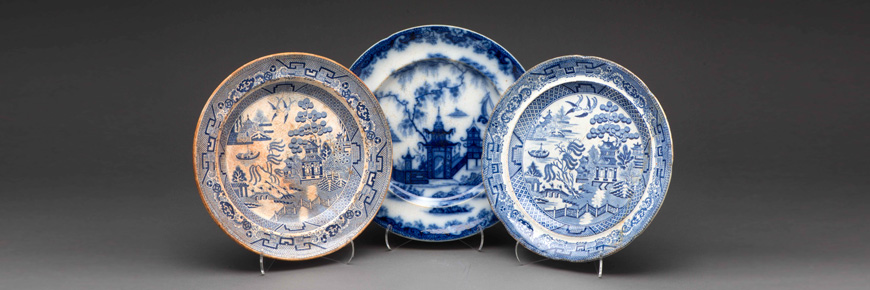
Food on board an Arctic expedition
Wrecks of HMS Erebus and HMS Terror National Historic Site
One thing is certain – the Franklin Expedition set off with a large quantity of food, enough for three years. The supply ship Barretto Junior accompanied the expedition as far as Greenland, where, in mid-July 1845, the crew transferred the extra supplies to HMS Erebus and HMS Terror. Sir John Franklin described the process in a letter: “the Transport was immediately taken alongside the ship that she might be the more readily cleared, and we have been constantly employed at that operation 'till last evening, the delay having been caused not so much in getting the stores transferred to either of the ships as in making the best stowage of them below as well as on the upper deck. The Ships are now complete with supplies of every kind for three years: they are therefore very deep.”
How much is enough?
Royal Navy records provide quantities of the various supplies:
| Supplies | HMS Erebus | HMS Terror | Total |
|---|---|---|---|
| Biscuits | 18355 lb. | 18132 lb. | 36487 lb. |
| Flour | 69888 lb. | 66768 lb. | 136656 lb. |
| Pemmican | 612 lb. | 591 lb. | 1203 lb. |
| Beef in 8-lb sections | 16416 lb. | 15808 lb. | 32224 lb. |
| Pork in 4-lb sections | 16320 lb. | 15680 lb. | 32000 lb. |
| Canned meats | 16066 lb. | 17223 lb. | 33289 lb. |
| Sugar | 11928 lb. | 11648 lb. | 23576 lb. |
| Canned vegetables | 4572 lb. | 4328 lb. | 8900 lb. |
| Spirits | 1896 lb. | 1788 gal. | 3684 gal. |
| Wine for the sick | 100 gal. | 100 gal. | 200 gal. |
| Tallow | 1568 lb. | 1484 lb. | 3052 lb. |
| Dried raisins | 504 lb. | 504 lb. | 1008 lb. |
| Peas | 75 bus. | 72 bus. | 147 bus. |
| Chocolate | 4822 lb. | 4628 lb. | 9450 lb. |
| Tea | 1195 lb. | 1162 lb. | 2357 lb. |
| Lemon juice | 4750 lb. | 4550 lb. | 9300 lb. |
| Equivalent soup concentrate | 10920 pt. | 9543 pt. | 20463 pt. |
| Vinegar | 677 gal. | 649 gal. | 1326 gal. |
| Pot barley | 1248 lb. | 1248 lb. | 2496 lb. |
| Oats | 690 gal. | 660 gal. | 1350 gal. |
| Marinades | 300 gal. | 280 gal. | 580 gal. |
| Cranberries | 85 gal. | 85 gal. | 170 gal. |
| Mustard | 500 lb. | 500 lb. | 1000 lb. |
| Pepper | 100 lb. | 100 lb. | 200 lb. |
Rations and recipes
Despite the amount of supplies, the daily diet would have been relatively monotonous, centered on salt beef and pork, as well as porridge. Canned soups and vegetables provided some variety, as well as vinegar, mustard, and pepper upon request. The ships packed over 8,000 cans. Some contained potatoes, carrots, parsnips, and mixed vegetables. A number of live cattle were on board at the outset of the expedition. Marinades were made of a mix of cabbage, onions and nuts. Pemmican – finely grated meat mixed with fat – was sometimes served with currants or sugar.
Cutlery
The men on board would have been required to bring their own cutlery. Officers had to have two forks, a table spoon, a dessert spoon, and a tea spoon, all made of silver. Many of the men onboard ate on ceramic plates, some decorated with a common blue willow motif. Parks Canada underwater archaeologists found some of these blue willow plates on the wreck of HMS Erebus.
The cooks
Richard Wall was cook aboard HMS Erebus. Originally from Hull in Yorkshire, he was 45 years old at the start of the expedition. The cook of HMS Terror was Londoner John Diggle, aged 36. The Royal Navy often recruited cooks from the ranks of older sailors who had suffered injuries or who had infirmities. Hunting and fishing provided variety to rations.
Mealtime
At the sound of the ship’s bell, crew gathered in their respective messes for meals. The crew ate at 3:00 pm and Sir John Franklin ate at 4:00 pm. When weather permitted, Franklin often invited Captain Crozier aboard HMS Erebus to dine.
Ship movement could make dining an adventure. Harry D. S. Goodsir of HMS Erebus wrote in a letter: “…you require however to be always on the outlook in case your opposite neighbour’s soup or beer or wine does not come pouring into your lap.”Footnote 1 James Fitzjames, Commander of HMS Erebus, described a storm during the voyage to Greenland: “We had a few seas on our decks, one of which found its way down on to our table, just as we had done dinner. I dined at our mess to-day, Sir John finding his guests could not hold on and eat too. We are packed close, and can’t move very far.”Footnote 2
Related links
- Date modified :

